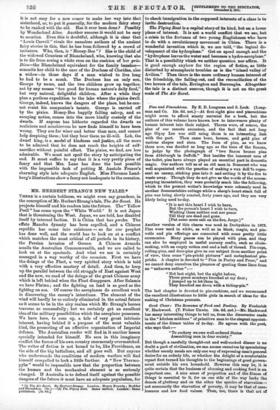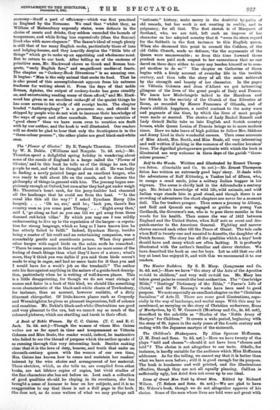Good Cheer: The Romance of Food and Feeding. By Frederick
W. Hackwood. (T. Fisher Unwin. 10s. 6d. net.)—Mr. Hackwood has many interesting things to tell us, from the discoveries made in the " kitchen raiddens " of primitive man to the elegant appoint- ments of the dinner tables of to-day. He agrees with the poet, who says that :—
" To cookery we owe well-ordered States Assembling men in dear society."
But though a carefully thought-out and well-cooked dinner is no doubt a part of civilization, we can amuse ourselves by speculating whether seemly meals are only one way of expressing man's general desire for an orderly life, or whether the delight of a comfortable repast first turned his thoughts to the beginnings of good govern- ment outside his own household. However this may be, it is quite certain that the business of choosing and cooking food is an important one. A nice sense of proportion and of the fitness of things is essential to it, for on one side of the way lurks the demon of gluttony and on the other the spectre of starvation— not necessarily the starvation of poverty, it may be that of care- lessness and low food values. Then, too, there is that art of economy—itself a part of efficiency—which was first practised in England by the Normans. We read that "whilst they, as William of Malmesbury expressly states, were delicate in the choice of meats and drinks, they seldom exceeded the bounds of temperance, and while living less expensively (than the Saxons) lived also with more elegance." The Saxon's ideal of rough plenty is still that of too many English cooks, particularly those of inns and lodging-houses, and they heartily despise the "little bits of things" which go to make up an appetising and wholesome meal. But to return to our book. After telling us of the customs of primitive man, Mr. Hackwood shows us Greek and Roman ban- quets, "early English fare," and magnificent mediseval feasts. The chapter on " Cookery-Book Diversions" is an amusing one. It begins : "Man is the only animal that cooks its food. That he is also proud of this accomplishment appears from his extreme fondness for writing about it. From the days of that noble Roman, Apicius, the output of cookery-books has gone steadily on, and entertaining reading many of them afford," and Mr. Hack- wood has given us an excellent reehauffi of the quaint things he has come across in his study of old receipt books. The chapter headed " Anthropophagy " is a gruesome one, and should be skipped by people who do not wish to increase their knowledge of the ways of ogres and other cannibals. Many more varieties of "good cheer" than we have room even to mention are dealt with by our author, and the book is well illustrated. Our readers will no doubt be glad to hear that only the frontispiece is in the " three-colour process "; the other plates are good black-and-white ones.



































































 Previous page
Previous page